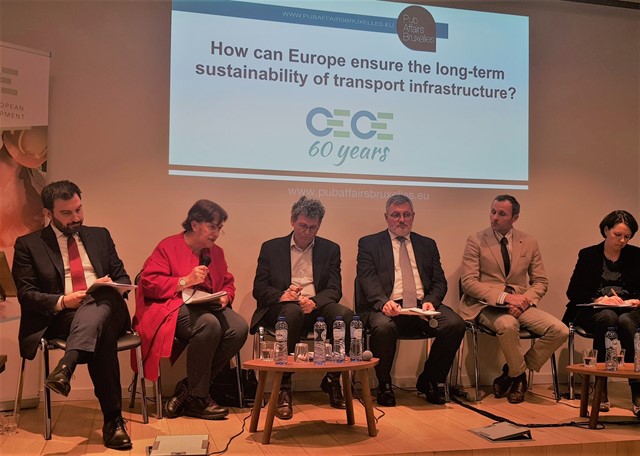How can Europe ensure the long-term sustainability of transport infrastructure?
On 1st April CECE co-organised a debate on how Europe can ensure the long-term sustainability of its transport infrastructure.
 From left: Riccardo Viaggi, Inés Ayala Sender, Laurent ZylberbergChristophe Nicodème, Thierry Goger, Pia Nieminen; source: CECE
From left: Riccardo Viaggi, Inés Ayala Sender, Laurent ZylberbergChristophe Nicodème, Thierry Goger, Pia Nieminen; source: CECE
The event was opened by introductory speeches by Roman Horvarth, Policy Officer, DG GROW, European Commission and CECE Secretary General Riccardo Viaggi. Riccardo presented the industry point of view on the digital, economic and social dimensions of sustainability of the transport infrastructure.
CECE called on the involvement of the construction sector as the provider of European infrastructure. In order to ensure better coorditation between policy areas impacted by transport and construction, the silos within the European Commission need to be broken down by renewing the goals and the spirit of the 'Construction 2020' initiative. The initiative needs to be relaunched in the next European Commission's mandate. "We call on public authorities at all levels to consider all elements of sustainability, mainly the economic one, by focusing on best value for money in public procurement of infrastructure" concluded Riccardo.
The debate's panel was well balanced by representatives from the EU institutions, the financial institutions and the industry itself. The fruitfull discussion was led by Secretary General of the European Long-Term Investors Association Helmut von Glasenapp and the panel consisted of MEP Inés Ayala Sender (S&D/ES), Pia Nieminen, Policy Advisor at the European Investment Bank, Laurent Zylberberg, Director of the Groupe Caisse des Dépôts, Thierry Goger, Secretary General, FEHRL, Christophe Nicodème, General Director of the European Union Road Federation and Riccardo Viaggi representing CECE.
The event attracted over 90 participants which indicates the relevance of the topic. Transport is the cornerstone of regional and social cohesion, as well as of the competitiveness of the EU as a global economic actor. The sector is not only an enabler of European integration and of the smooth functioning of the EU’s internal market, but it has also proved crucial for its added value to growth and jobs as a main element of the EU’s economic activity, as well as an important industrial domain in its own right. In addition, the availability and the quality of transport services have strong implications for both European industry and the EU’s choice of trading partners.
Against this backdrop, the question of transport infrastructure has become essential in view of Europe’s ageing transport network, the necessity of assuring sufficient investment at the EU level in everyday needs, and for the modernisation of the Union’s transport system: all inextricably linked to the environmental and digital transformation of economy and society. To this end, the European Commission has launched the negotiations for the next Multiannual Financial Framework for the period 2021-2027, which comes at a time of renewed dynamism and of great challenges for Europe.
More news